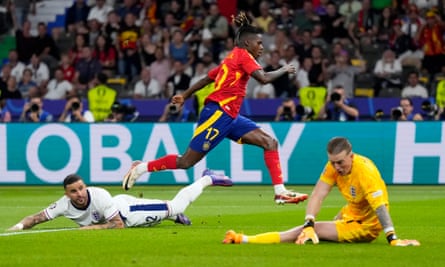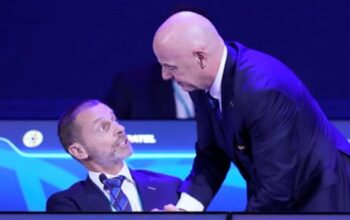The metal crinkle of squashed pilsner cans runs up the train carriage like electricity. A song goes up: “His name is Johnny, Johnny fucking Stones, de-der der der der der de-de-de-de der.” An announcement: “Nächste station, Olympiastadion.” Another song: “Phil Foden’s on fire and he’s playing the Germans off the park.” Doors slide open. The air smells of sweat, piss, bratwurst and possibility.
There is a montage on the big screen. There are some rondos on the pitch. There is a largely forgettable musical hors d’oeuvres which sounds like a group of guys trapped under the rubble of a collapsed nightclub, screaming for help over a pounding disco beat. Pennants are exchanged. Flags draped over the barriers like beach towels. The Spanish comfortably outnumbered. This could be Benidorm or anywhere.
They have come however they can, by car and campervan, train and plane: the final whistle in Dortmund on Wednesday night a kind of bat-signal that only the true English lad can hear. Now it’s zero hour in Hitler’s stone-clad power-dome, which a few moments before kick-off resounds to the strains of Ten German Bombers. Yesterday, we hope. Tomorrow, we hurt. Today, we play.
Kobbie Mainoo takes the kick, Jordan Pickford boots it straight out of play, and this turns out to be one of England’s most fluid moves of the game. By 35 minutes England are printing photographs of the football and pinning them to trees and lampposts, as if it were a lost cat. Possession statistics after 20 minutes: Spain 71%, Pickford 29%.
And though chances are few, in hindsight there are glimpses of what comes later. Kyle Walker could scarcely be doing a less effective job of stopping Nico Williams than if he had been armed with a clipboard and a sheaf of Jehovah’s Witnesses pamphlets. Foden – who is very much not on fire, and is really at best quietly smouldering – takes a corner that moves with all the speed and fluency of the passport queue at Stansted airport.
But the centre has held. The press is attentive rather than intrusive. England are treating Lamine Yamal the way the English treat pretty much every precocious 17-year-old: by lavishly showering him with attention and hoping he does something embarrassing in public. John Stones surges out of defence and gallops right to the edge of the Spanish penalty area like a man marching straight into the Nando’s kitchen to demand his Wing Roulette. It achieves nothing. But it feels agreeably on-brand, a pointlessly intrepid act, an act of pure Englishness.
As the second half begins something remarkable happens: Rodri is off injured. This feels like a moment. The consensus is that everything is basically going according to plan for England. Keep it tight first 60. Stay in the game. Unleash the subs. Cry havoc and let slip the tricky forward from Aston Villa. Flight Monday, parade Tuesday, knighthoods in the post.

At which point, Spain score. Actually, it’s even more comprehensive than that. Spain kick off, and every single one of their players touches the ball before England have even completed a second-half pass. The energy in these minutes feels desperate, meek, inadequate. Still high on the irresistible fumes of their own heroism at this tournament, perhaps England are so convinced they will seize their one big chance when it comes that they never really stop to consider: what if it never comes?
The ghost of Harry Kane comes off for the entirely corporeal Ollie Watkins, and this is not the plan, but nor is this panic, nor caution or inertia, but exactly the defibrillation England need right now. Mainoo, a little lost in the woods, is replaced by Cole Palmer, and in retrospect this is the moment when England realise this is a game that needs to be plundered, not negotiated. Forget the handbrake. There is no handbrake. The handbrake has been ripped out of its socket and is now being wielded like a truncheon.
after newsletter promotion
England’s equalising goal comes on 73 minutes. This feels too soon. There is jubilation but no sense of crowning finality. Instead it is Mikel Oyarzabal’s sliding lunge, four minutes from time, that decides the game. As Spain’s substitutes spill onto the pitch, Anthony Gordon springs off the England bench to pump his arms. Kieran Trippier claps his hands. But most of them sit. And watch. And feel the dream slipping through their pores like water.
Did England truly want this? Of course. Did they believe? Almost certainly. But did they truly know they deserved it, as if by winning they were simply executing a fate decreed for them in advance? Perhaps, ultimately, this is what separates the great sides like Spain from the great triers like England. Perennial contenders. Really strong. They’ll be there or thereabouts. But you cannot be what you cannot really see.
England tried to burgle this tournament: to ram-raid it and dive through the plate glass and leave with the Henri Delaunay trophy smuggled under one arm and a crate of Neck Oil under the other. Time and again they pushed open the train doors just as they were about to close. Perhaps against less resolute opponents, it might even have been enough here. Instead there is a familiarity to this failure: a tale of hopes and wishes where a plan was badly needed.
Source: theguardian.com


